人教新目标版八年级英语下册初二1-10期末复习单元知识点语法总结
人教版初中英语八年级下册全册各单元知识点、语法归纳整理
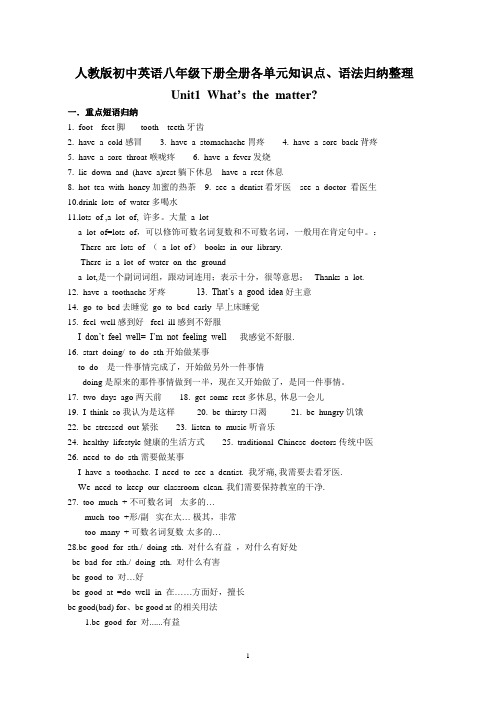
人教版初中英语八年级下册全册各单元知识点、语法归纳整理Unit1 W hat’s the matter?一.重点短语归纳1. foot---feet 脚tooth---teeth 牙齿2. have a cold 感冒3. have a stomachache 胃疼4. have a sore back背疼5. have a sore throat喉咙疼6. have a fever发烧7. lie down and (have a)rest 躺下休息have a rest 休息8. hot tea with honey 加蜜的热茶9. see a dentist 看牙医see a doctor 看医生10.drink lots of water多喝水11.lots of ,a lot of, 许多。
大量a lota lot of=lots of,可以修饰可数名词复数和不可数名词,一般用在肯定句中。
:There are lots of (a lot of)books in our library.There is a lot of water on the grounda lot,是一个副词词组,跟动词连用;表示十分,很等意思;Thanks a lot.12. have a toothache牙疼13. That’s a good idea好主意14. go to bed 去睡觉go to bed early 早上床睡觉15. feel well感到好 feel ill 感到不舒服I don’t feel well= I’m not feeling well我感觉不舒服.16. start doing/ to do sth开始做某事to do 是一件事情完成了,开始做另外一件事情doing是原来的那件事情做到一半,现在又开始做了,是同一件事情。
17. two days ago两天前18. get some rest 多休息, 休息一会儿19. I think so我认为是这样20. be thirsty口渴21. be hungry 饥饿22. be stressed out紧张23. listen to music听音乐24. healthy lifestyle健康的生活方式25. traditional Chinese doctors传统中医26. need to do sth 需要做某事I have a toothache. I need to see a dentist. 我牙痛, 我需要去看牙医.We need to keep our classroom clean. 我们需要保持教室的干净.27. too much + 不可数名词太多的…much too +形/副实在太…极其,非常too many + 可数名词复数太多的…28.be good for sth./ doing sth. 对什么有益,对什么有好处be bad for sth./ doing sth. 对什么有害be good to 对…好be good at =do well in 在……方面好,擅长be good(bad) for、be good at的相关用法1.be good for 对......有益Doing morning exercises is good for your health.做早操对你们的建康有益。
Unit1-Unit10单元知识点人教版英语八年级下册
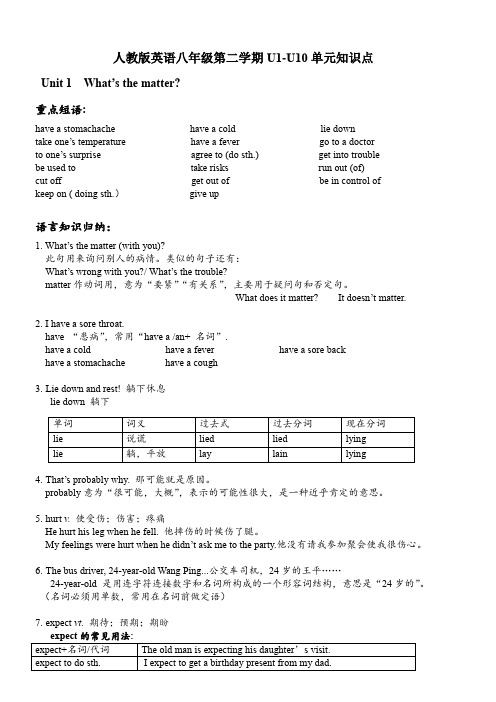
人教版英语八年级第二学期U1-U10单元知识点Unit 1 What’s the matter?重点短语:have a stomachache have a cold lie downtake one’s temperature have a fever go to a doctorto one’s surprise agree to (do sth.) get into troublebe used to take risks run out (of)cut off get out of be in control ofkeep on ( doing sth.)give up语言知识归纳:1. What’s the matter (with you)?此句用来询问别人的病情。
类似的句子还有:What’s wrong with you?/ What’s the trouble?matter作动词用,意为“要紧”“有关系”,主要用于疑问句和否定句。
What does it matter? It doesn’t matter.2. I have a sore throat.have “患病”,常用“have a /an+ 名词”.have a cold have a fever have a sore backhave a stomachache have a cough3.Lie down and rest! 躺下休息lie down 躺下4.That’s probably why. 那可能就是原因。
probably意为“很可能,大概”,表示的可能性很大,是一种近乎肯定的意思。
5.hurt v.使受伤;伤害;疼痛He hurt his leg when he fell. 他摔伤的时候伤了腿。
My feelings were hurt when he didn’t ask me to the party.他没有请我参加聚会使我很伤心。
新人教版八年级英语下册第1--第10单元知识点总结
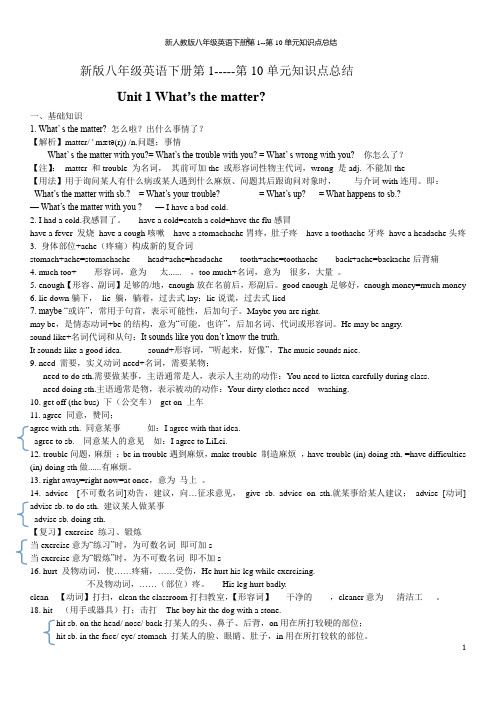
新版八年级英语下册第1-----第10单元知识点总结Unit 1 What’s the matter?一、基础知识1. What’ s the matter? 怎么啦?出什么事情了?【解析】matter/ ' mætə(r)) /n.问题;事情What’ s the matter with you?= What’s the trouble with you? = What’ s wrong with you? 你怎么了?【注】:matter 和trouble 为名词,其前可加the 或形容词性物主代词,wrong 是adj. 不能加the【用法】用于询问某人有什么病或某人遇到什么麻烦、问题其后跟询问对象时,与介词with连用。
即:What’s the matter with sb.? = What’s your trouble? = What’s up? = What happens to sb.?—What’s the matter with you ?— I have a bad cold.2. I had a cold.我感冒了。
have a cold=catch a cold=have the flu感冒have a fever 发烧have a cough咳嗽have a stomachache胃疼,肚子疼have a toothache牙疼have a headache头疼3. 身体部位+ache(疼痛)构成新的复合词stomach+ache=stomachache head+ache=headache tooth+ache=toothache back+ache=backache后背痛4. much too+ 形容词,意为太...... ,too much+名词,意为很多,大量。
5. enough【形容、副词】足够的/地,enough放在名前后,形副后。
good enough足够好,enough money=much money6. lie down躺下,lie 躺,躺着,过去式lay;lie说谎,过去式lied7. maybe “或许”,常用于句首,表示可能性,后加句子。
人教新目标八年级下各单元知识点整理

人教新目标八年级下期末复习知识点整理Unit 1 Will people have robots?1.形容词,副词的比较等级考查热点透视:a) 表示A与B在程度上相同时,“as+形容词或副词的原级+as”结构。
表示A不如B时,可用“not as/so+形容词或副词的原级+as”结构。
b) 表示A比B在程度上“更…..”时,可用“形容词或副词的比较级+than”结构c) 表示三者或三者以上的比较,其中一个在程度上“最…..”时,常用“the+形容词或副词的最高级”结构,后面可带“of/in的短语”来说明比较的范围。
(注意:副词的最高级在句中常省略“the”.)d) 在形容词或副词的比较级前,可以用“a little, even, far, much,still”的等词语来修饰,以加强语气。
e) 表示“越来越….”时,常用“形容词或副词的比较级+and+形容词或副词的比较级”结构,但要注意,对于多音节和部分双音节形容词,副词而言,若要表达此意时,要用“more and more+形容词或副词的原级“结构。
f) 在表示“其中最….之一“的含义时,常使用“one of+the+形容词最高级形式+名词复数”结构,其中的定冠词the不可以省略。
g) 如果强调“两者中比较…的(一个)”的意思时,可使用“the+形容词比较级+其它”结构。
h) 表示“越….越….”, 可使用“the+形容词或副词的比较级,the+形容词或副词的比较级”结构。
2 .一般将来时a) 一般将来时的构成:由助动词shall或will加动词原形构成,shall用于第一人称。
在口语中,will在名词或代词后常简略为’ll,will not常简略为won’t。
这个时态的肯定,否定和疑问结构可表示如下:用”be going to +动词原形”也可表示将来时,表示将要发生的事,打算或决定要做的事。
b)一般将来时的用法:1)表示将要发生的动作或情况;2)不以人的意志为转移,肯定要发生的事情。
初中英语人教新目标八年级下册 Unit 1 复习(主要短语+知识点讲解+单元语法)
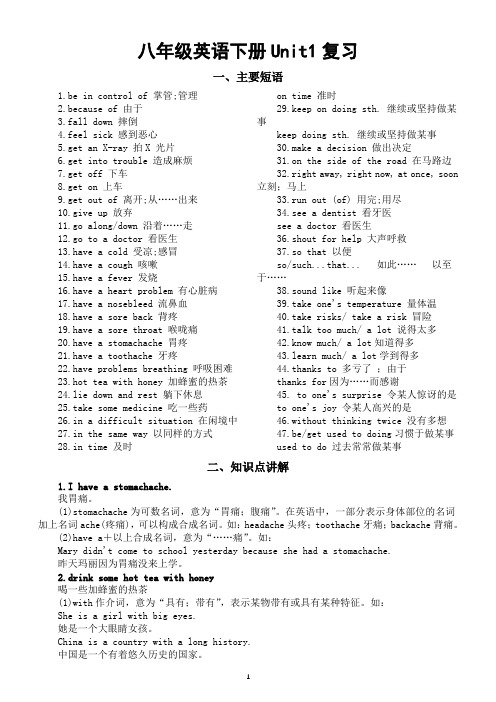
八年级英语下册Unit1复习一、主要短语1.be in control of 掌管;管理2.because of 由于3.fall down 摔倒4.feel sick 感到恶心5.get an X-ray 拍X 光片6.get into trouble 造成麻烦7.get off 下车8.get on 上车9.get out of 离开;从……出来10.give up 放弃11.go along/down 沿着……走12.go to a doctor 看医生13.have a cold 受凉;感冒14.have a cough 咳嗽15.have a fever 发烧16.have a heart problem 有心脏病17.have a nosebleed 流鼻血18.have a sore back 背疼19.have a sore throat 喉咙痛20.have a stomachache 胃疼21.have a toothache 牙疼22.have problems breathing 呼吸困难23.hot tea with honey 加蜂蜜的热茶24.lie down and rest 躺下休息25.take some medicine 吃一些药26.in a difficult situation 在闲境中27.in the same way 以同样的方式28.in time 及时on time 准时29.keep on doing sth. 继续或坚持做某事keep doing sth. 继续或坚持做某事30.make a decision 做出决定31.on the side of the road 在马路边32.right away, right now, at once, soon 立刻;马上33.run out (of) 用完;用尽34.see a dentist 看牙医see a doctor 看医生36.shout for help 大声呼救37.so that 以便so/such...that... 如此……以至于……38.sound like 听起来像39.take one's temperature 量体温40.take risks/ take a risk 冒险41.talk too much/ a lot 说得太多42.know much/ a lot知道得多43.learn much/ a lot学到得多44.thanks to 多亏了;由于thanks for因为……而感谢45. to one's surprise 令某人惊讶的是to one's joy 令某人高兴的是46.without thinking twice 没有多想47.be/get used to doing习惯于做某事used to do 过去常常做某事二、知识点讲解1.I have a stomachache.我胃痛。
期末Units1-10单元知识点总结 人教版八年级英语下册
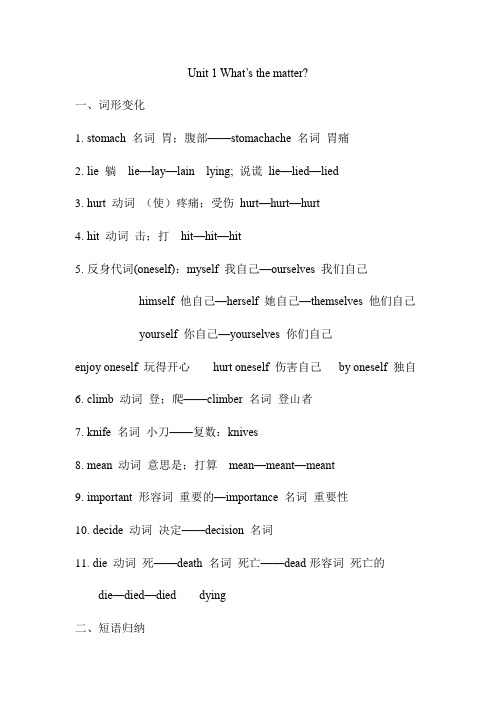
Unit 1 What’s the matter?一、词形变化1.stomach 名词胃;腹部——stomachache 名词胃痛2.lie 躺lie—lay—lain lying; 说谎lie—lied—lied3.hurt 动词(使)疼痛;受伤hurt—hurt—hurt4.hit 动词击;打hit—hit—hit5.反身代词(oneself):myself 我自己—ourselves 我们自己himself 他自己—herself 她自己—themselves 他们自己yourself 你自己—yourselves 你们自己enjoy oneself 玩得开心hurt oneself 伤害自己by oneself 独自6.climb 动词登;爬——climber 名词登山者7.knife 名词小刀——复数:knives8.mean 动词意思是;打算mean—meant—meant9.important 形容词重要的—importance 名词重要性10.decide 动词决定——decision 名词11.die 动词死——death 名词死亡——dead形容词死亡的die—died—died dying二、短语归纳1.lie down 躺下to one’s (my/his/her...) surprise 令某人惊讶的是2.take one’s (my/your/his/her..) temperature 量体温3.take a break = take breaks 休息take a risk = take risks冒险4.run out 物做主语:The money ran out. 钱用光了。
run out of 人做主语:I ran out of money. 我用光了钱。
5.make a decision = make decisions 做决定6.be in control of 掌管He is in control of the company. 他掌管公司。
人教版新目标八年级下册英语期末复习(语法)
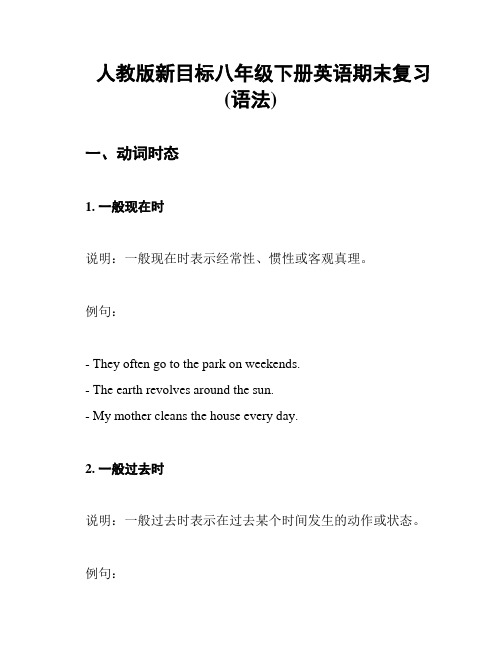
人教版新目标八年级下册英语期末复习(语法)一、动词时态1. 一般现在时说明:一般现在时表示经常性、惯性或客观真理。
例句:- They often go to the park on weekends.- The earth revolves around the sun.- My mother cleans the house every day.2. 一般过去时说明:一般过去时表示在过去某个时间发生的动作或状态。
例句:- I visited my grandparents last summer.- She lived in London when she was young.- They played basketball yesterday.3. 现在进行时说明:现在进行时表示此时此刻正在进行的动作。
例句:- We are studying for the exam right now.- Look! Mary is dancing in the classroom.- They are having dinner at the restaurant.4. 一般将来时说明:一般将来时表示将来某个时间将要发生的动作。
例句:- We will go to the beach next weekend.- She is going to travel to Europe next month.- They will have a party for their anniversary.5. 现在完成时说明:现在完成时表示过去发生的动作对现在有影响或结果。
例句:- I have finished my homework.- Have you ever been to China?- They have lived in this city for five years.二、被动语态被动语态由助动词"be"和动词的过去分词构成。
人教版八年级下册各单元英语语法解析知识重点总结
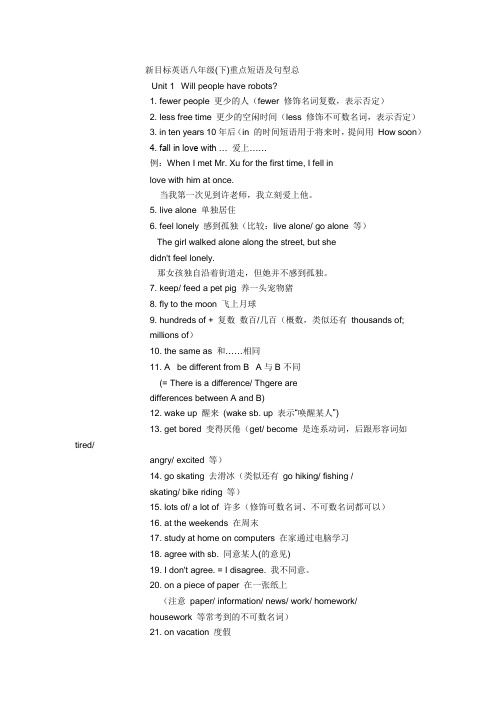
新目标英语八年级(下)重点短语及句型总Unit 1 Will people have robots?1. fewer people 更少的人(fewer 修饰名词复数,表示否定)2. less free time 更少的空闲时间(less 修饰不可数名词,表示否定)3. in ten years 10年后(in 的时间短语用于将来时,提问用How soon)4. fall in love with … 爱上……例:When I met Mr. Xu for the first time, I fell inlove with him at once.当我第一次见到许老师,我立刻爱上他。
5. live alone 单独居住6. feel lonely 感到孤独(比较:live alone/ go alone 等)The girl walked alone along the street, but shedidn't feel lonely.那女孩独自沿着街道走,但她并不感到孤独。
7. keep/ feed a pet pig 养一头宠物猪8. fly to the moon 飞上月球9. hundreds of + 复数数百/几百(概数,类似还有thousands of;millions of)10. the same as 和……相同11. A be different from B A与B不同(= There is a difference/ Thgere aredifferences between A and B)12. wake up 醒来(wake sb. up 表示“唤醒某人”)13. get bored 变得厌倦(get/ become 是连系动词,后跟形容词如tired/angry/ excited 等)14. go skating 去滑冰(类似还有go hiking/ fishing /skating/ bike riding 等)15. lots of/ a lot of 许多(修饰可数名词、不可数名词都可以)16. at the weekends 在周末17. study at home on computers 在家通过电脑学习18. agree with sb. 同意某人(的意见)19. I don't agree. = I disagree. 我不同意。
新目标人教版初二下unit1--unit12单元知识点总结
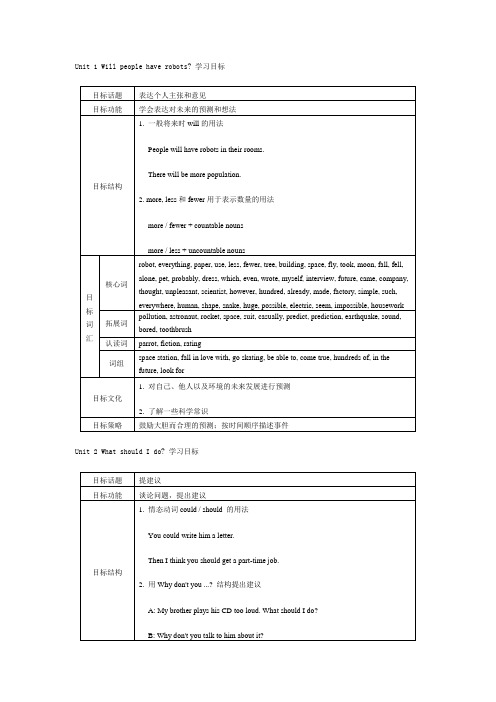
skater, shell, monster, globe, collector, common, extra, topic, writer, the Olympic Games, particularly
认读词
marathon, Jewish, Jew
词组
run out of, by the way, be interested in, more than, far away
If it is fine tomorrow, we will go on a picnic.
If the weather does not clear, we won't go for a walk.
2.情态动词should,用于提出要求或建议
You should ask them to come here on time.
认读词
professional, dining room, consequence, explain, strategy, improve, following
词组
take away, around the world, all the time, in order to, make a living
目标文化
奥林匹克的由来
目标策略
合作学习;略读技巧
【下一篇】
相关文章
Unit 8 Why don't you get her a scarf?学习目标
【下一篇】
相关文章
Unit 8 Why don't you get her a scarf?学习目标
相关文章
Unit 8 Why don't you get her a scarf?学习目标
八年级下Unit1-Unit10语法点复习

例:What about buying her a bag?
That's a good idea.
⑵委婉拒绝对方的建议时:
• • ①I'd love/like to,but……/I'm afraid…… ②Sorry, I can't../Sorry, but……
• 构成:助动词will+动词原形,will用于各种人称,will在名 词或代词后常缩略为’ll。 Lily will go to the zoo tomorrow. • 否定形式:will not=(won’t) I won't give tickets to you. • 疑问形式:Will sb do sh? 肯定答语:Yes, sh will. 否定答语:No, sb won't.
⑵“How/What about +名词/代词/动名词„„?”多为建议对方一起做
某事,有征询对方意见的含义,意为:“„„怎么样?”例如: How about buying a new washing machine?
回答建议的表达方式 ⑴同意对方的建议时:
• ①OK./All right.
•
•
②I'd love/like to.
• We will go to the zoo if it doesn't rain tomorrow. • He will have a birthday party if he gets good grades. • You must stop if the traffic light is red. • You can buy a new dress if yours is old.
人教版八年级下册英语期末复习:各单元重要语法知识点总结(实用!)

人教版八年级下册英语期末复习: 各单元重要语法知识点总结Unit 11.th.+ad.表示一类人, th.+姓氏复数形式, 表示夫妇两人或一家人, 谓语动词用复数2.hav.difficulty/troubl./problem.i.doin.st.“做某事有困难”,doing前的in可以省略。
3.动词不定式用法①动词不定式作宾语。
v+ to do sth 常见的动词有: want, decide, hope, plan,would like ,等, 表示还没有做的动作。
②动调不定式作状语。
表示行为、目的、结果。
句子+to do sth 或To do sth , + 句子③动词不定式作宾语补足语。
v+s..t.d.sth.常用动词有: as..wan..tell.wis.H.tol.me(mot).today、他叫我今天④表示感觉的动词, 如see,hear,notice,feel 等, 以及使役动词let, have,make等后常用省略to的动词作宾语补足语。
l see him leave.我看见他离开了。
⑤做主语。
做主语时常和It’s+ adj + for + sb + to do sth 转换, it's是形式主语, 动词不定式是真实主语⑥做定语。
a house to live in 住的房间paper to write on 写的纸。
此时的动词不定式与所修饰的名词构成动宾或逻辑关系。
4.happen的用法①sth.happene.t.s.某人出了某事(常指不好的事. eg:Wha.happene.t.you?你怎么啦?②sb.happen(s)to do sth.某人碰巧做某事eg: I happened to meet a friend of mine in the street yesterday.③辨析happen / take place happen是突然发生, 偶然发生的事, take place是按计划, 安排发生的事。
人教新目标八年级英语下册全书大归纳

10.What do you think of ...?你认为...怎么样? What do you think of the book?你认为这本书怎么样? 11.It is+adj.(for /of sb.)+to dosth./It is+adj.+that从句. It is important for us to learn English well. 对我们来说,学好英语很重要。 It's clever of you to work out the math problem. 你真聪明,解出了这道数学题。 12.not...until...直到...才... He didn't go to bed until he finished the work. 他直到完成工作才上床睡觉。 13.one of the+形容词最高级+复数名词 最...之一 English is one of the most useful languages in the world. 英语是世界上最有用的语言之一。
二.常考英语短语和句型 1.would like to do sth.想要做某事 I would like to go to an inexpensive restaurant. 我想去一家花费少的餐馆。 2.Could you please ...?请你.....好吗? Could you please open the the window ? 请你打开窗户好吗? 3.have problems (in) doing sth.做某事有困难 He had problems (in)researching the top of the mountain. 他到达山顶有困难。 ed to do sth.过去常常做某事 I used to get up early.我过去常常起床很早。 5.decide to do sth.决定做某事 I decided to go somewhere quiet. 我决定去某个安静的地方。
人教新目标英语八年级下全册知识点总结

人教新目标八年级下全册知识点总结八年级下Unit1—-—Unit3一.重点短语1。
live to be 200 years old 活到200岁2.fall in love with3。
be able to =cane true(无被动语态)= chieve5。
in space 在太空中6.wake up7。
over and over again8.on computers9。
get bored10。
argue with sb11。
out of style12.write sb a letter=write to sb13。
a ticket to 一张……的票14。
on the phone / by phone15.get on well with sb16.have a fight with sb / fight with sbplain aboutpare…with19.pay for(it/them)20.the same age as21.on the one hand…on the other hand22.(all)by oneself=alone23。
for the first time24.in history25。
as…as possible = as…as sb can26。
keep out不让……进入27.call the police28。
answer the phone29.take off30。
follow sb to do sth31。
at that time32.hear about / hear of33。
in silence 默默地34.take place / happen (无被动语态)35.one's own +名词=名词+of one's own二、考点归纳考点1。
There be -—----—(将来时)There is/are going to be ( will be )+名词。
人教版八年级下册英语期末复习:Unit 1-Unit 10 各单元重点语法知识点汇编(全面!)

人教版八年级下册英语期末复习:Unit 1-Unit 10各单元重点语法知识点汇编Unti1 what’s the matter?一、四会单词Matter, stomachache, foo, neck, stomach,throat, fever, toothache , headache, break, passenger,trouble, knee, nosebleed, climber, accident,situation, blood, importance, decision, spirit,death, nurse,lie, hurt,hit,press,breathe,mean,herself,ourselves,sore,sick, sunburned,cough, bandage, risk , control二、重点词组与句子1.too much 太多2.lie down 躺下3.get an X-ray 做个X光检查4.take one ’s temperature 量体温5.put some medicine on ......在....上敷药6.have a fever 发烧7.take breaks /take a break 休息8.without thinking twice 没多想9.get off 下车10.take sb to the hospital 送某人去医院11.wait for等待12.to one’s surprise 使.......惊讶的13.thanks to多亏于;由于14.in time及时15.think about 考虑16.have a heart problem患有心脏病17.get into the trouble 遇到麻烦18.do the right thing做正确的事情事情19.fall down 摔倒20.put ...... on sth把...放在某物上21.get hit/sunburned 摔伤/烧伤22.be interested in 对.....感兴趣23.be used to 习惯于.... 24.take risks/take a risk 挑战25.lose one’s life 失去生命26.because of 因为27.run out of 用完28.cut off 切除29.get out of 从...出来30.make a decision/decisions 做决定31.be in control of 掌管;管理32.give up 放弃重点句子:1.She talked about too much and didn’t drink enough water.She has a very sore throat.2.You need to take breaks away from the computer.3.I think I sat in the same way for too long without moving.4.The driver saw an old man lying on the side of the road,a woman next to him was shouting for help.5.He expected most of or all of the passengers to get off and wait for the next bus.6.Thanks to him and the passengers,the mas was saved by doctors in time.7.It’s sad that many people don’t want to help others because they don’t want any trouble.8.The driver didn’t think about himself,he only thought about saving a life.9.There were many times when Aron almost lost his life because of accidents.10.Because he could not free his arm,he stayed there for five days and hoped that someone would find him.11.When his water ran out,he knew that he would have to do something to save his own life.12.Let’s think about it before we find ourselves “between a rock and a hard place”,and before we have to make a decision that could mean life or death.重点搭配:1.need to do sth .需要去做某事2.see sb doing sth 看见某人正在做某事3.ask sb sth 询问某人某事4.expect sb to do sth 期望某人做某事5.agree to do sth 同意做某事6.help sb (to) do sth 帮助某人做某事7.want to do sth 想要做某事8.tell sb to do sth 告诉某人做某事9.have problems(in) doing sth 做某事有困难e sth to do sth用某物去做某事11.be/get used to doing sth 习惯于做某事12.seem to do sth 好像做某事13.keep on doing sth 继续做某事14.mind doing sth 介意做某事语法点1.询问某人的健康问题及遇到麻烦的表达方法2.情态动词should的用法3.不定代词的用法精细解读1. What’s the matter (with you)? 怎么了?出什么事了?What’s the trouble/ the problem / wrong with sb./ sth.?2. I had a cold.我感冒了。
新目标八年级英语下册1-10单元知识点及难点精讲及归纳
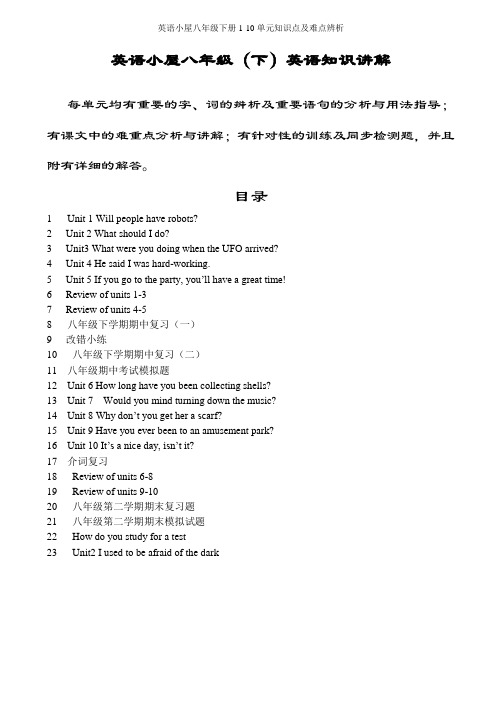
英语小屋八年级(下)英语知识讲解每单元均有重要的字、词的辨析及重要语句的分析与用法指导;有课文中的难重点分析与讲解;有针对性的训练及同步检测题,并且附有详细的解答。
目录1 Unit 1 Will people have robots?2 Unit 2 What should I do?3 Unit3 What were you doing when the UFO arrived?4 Unit 4 He said I was hard-working.5 Unit 5 If you go to the party, you’ll have a great time!6 Review of units 1-37 Review of units 4-58 八年级下学期期中复习(一)9 改错小练10 八年级下学期期中复习(二)11 八年级期中考试模拟题12 Unit 6 How long have you been collecting shells?13 Unit 7Would you mind turning down the music?14 Unit 8 Why don’t you get her a scarf?15 Unit 9 Have you ever been to an amusement park?16 Unit 10 It’s a nice day, isn’t it?17 介词复习18 Review of units 6-819 Review of units 9-1020 八年级第二学期期末复习题21 八年级第二学期期末模拟试题22 How do you study for a test23 Unit2 I used to be afraid of the darkUnit 1Will people have robots?II. Grammar:·一般将来时·there will be ·few,a few,little,a little,much,many语法小结:一、一般将来时1.用be doing表示将来:主要意义是表示按计划、安排即将发生的动作,常用于位置转移的动词。
人教版新目标八年级下册全册知识要点
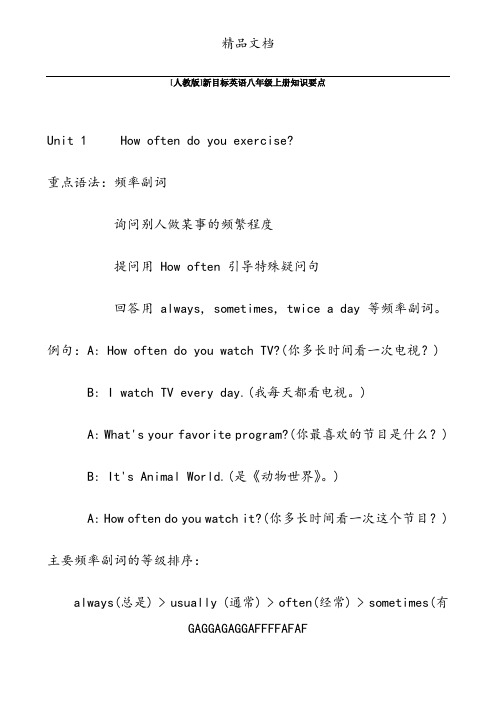
[人教版]新目标英语八年级上册知识要点Unit 1 How often do you exercise?重点语法:频率副词询问别人做某事的频繁程度提问用 How often 引导特殊疑问句回答用 always, sometimes, twice a day 等频率副词。
例句:A: How often do you watch TV?(你多长时间看一次电视?) B: I watch TV every day.(我每天都看电视。
)A: What's your favorite program?(你最喜欢的节目是什么?) B: It's Animal World.(是《动物世界》。
)A: How often do you watch it?(你多长时间看一次这个节目?) 主要频率副词的等级排序:always(总是) > usually (通常) > often(经常) > sometimes(有GAGGAGAGGAFFFFAFAF时) > hardly ever(很少) > never(从不)隔一段时间做某事数次用数词 + 时间间隔的结构构成。
如:once a week 一周一次(“一次”用特殊词 once)twice a day 一天两次(“两次”用特殊词 twice)three times a month 一个月三次(三次或三次以上用基数词 + times 的结构构成)four times a year 一年四次重点短语:how often 多久一次as for 至于;关于how many 多少(针对可数名词)how much 多少(针对不可数名词)of course = sure 当然;确信look after = take care of = care for 照顾;照看GAGGAGAGGAFFFFAFAFa lot of = lots of = plenty of 许多;大量 every day 每一天every night 每晚hardly ever 几乎不be good for 对……有益be good for one's health 有益健康try to do sth. 尝试做某事get good grades 取得好成绩help sb. [to] do sth. 帮助某人做某事kind of 有点want [sb.] to do sth. 想要(某人)做某事 keep in good health 保持健康No two men think alike. 人心各异。
- 1、下载文档前请自行甄别文档内容的完整性,平台不提供额外的编辑、内容补充、找答案等附加服务。
- 2、"仅部分预览"的文档,不可在线预览部分如存在完整性等问题,可反馈申请退款(可完整预览的文档不适用该条件!)。
- 3、如文档侵犯您的权益,请联系客服反馈,我们会尽快为您处理(人工客服工作时间:9:00-18:30)。
(3)表示请求的句式: Would you like to do...? Would you mind doing...? Let’s do.... Shall I/we do...? Please do...(祈使句前加please) 比较:could you please...和 could I Please... 前者是请求别人帮忙 后者是有礼貌地向别人请求允许
E. 动词不定式作状语
主要用来修饰动词,表示目的,结果或原 因。为了强调目的,有时可以把动词不定 式放在句首,或在不定式前加 in order (to) 或so as (to) “为了,目的 是常”用。结构:
too + adj./adv. + to do sth.
F. 固定句式
had better (not) do sth. Would you like to do sth.? Why not do sth.? Would you please (not) do sth.?
常用形式:
V.+ to do sth.
C. 作(后置)定语 常用形式: ①have/has+sth.+to do ②enough+名词+to do ③It’s time to do sth.
D. 作宾语补足语 tell, ask, want, invite, teach, like, call,等 可接带to的动词不定式作宾语补足语
(2)要表达身体疼痛或不舒服,可用以下结构:
①某人+have/has+病症. ②某人 +have/has+a+headache/toothache/stomachache/back ache/earache. ③某人+have/has+a+sore+发病部位. ④某人+hurt(s)+身体部位或反身代词. ⑤某部位+hurt(s). ⑥某人+have/has+a pain+in one’s+身体部位。 ⑦(There is)something wrong with one’s+身体部位.
二 情态动词should的用法
1.Should为情态动词,意为“应该;应当”, 否定式为shouldn’t,其后接动词原形,无人称 和数的变化。常用来表示征询意见、建议、劝 告、要求或义务等。
2.Should用于主语为第一人称的疑问句,表示 征询意见。
【拓展】在英语中,表示建议:
①Would you like (to do) sth.? = feel like doing 想要/愿意(做)某事吗? ②Shall I/we do sth ?做…好吗? ③Why not do sth ? = why don't you do sth ?为什么不…呢? ④How/What about doing sth ?做某事怎么样? ⑤Let’s do sth让我们做…吧。 。 ⑥had better (not) do sth最好(不)要做某事。
Unit 3 Could you please clean your room?
Could you please...?句型
(1)请求别人时通常用此句型.用could在语气上更委 婉、客气、诚恳。
(2肯)定对:cosuurlde/ycoeurt/aI.i.n.?ly的/o问f c句ou作rs出e 回答 否定:sorry或oh,please don’t…
①It +be+adj./n.+(for/of sb.) to do sth.
②It takes sb. some time to do sth.
B. 作宾语——动词 want, decide, hope, ask, agree, choose, learn, plan, need, teach, prepare,等后 常接动词不定式作宾语。
Unit 2 I'll help clean up the city parks 动词不定式
A. 作主语 B. 作宾语 C. 作(后置)定语 D. 作宾语补足语 E. 动词不定式作状语 F. 固定句式
A. 作主语——为避免句子的头重脚轻,常 用it作为形式主语,而真正的主语动词不 定式后置。 常用句型:
Unit 4 Why don't you talk to your parents?
一、提建议向别人发出邀请,请求,建议,或征求某人 的意见的其他表达方式:
How /what about doing sth.?…怎么样? You’d better (not) do something.最好(不)做某事 Would you like sth …?想要… Let‟s do sth…? What should I do …?
二、until, so that ,although引导的状语从句: 1.在带有till或until引导的时间状语从句里,如果 主句用肯定式,表示“一直到…时”,谓语动 词只能用延续性动词。
Review of Units 1-5
Unit 1 What’s the matter?
一、询问某人的健康问题及遇到麻 烦的表达方法
二、情态动词should的用法
一、 询问某人的健康问运及遭到麻烦的表达 (1)询问某人患了何种疾方病法或遇到了何种麻烦时,
常用以下几种结构来表达:
What’s the matter (with sb.)?(某人)怎么了? What’s wrong (with sb.)?(某人)怎么了? What’s the trouble (with sb.)?(某人)出什么事 了? What happened (to sb.)?(某人)发生了什么事? Are you OK?你没事吧? Is there anything wrong with sb.?某人有什么事吗?
常用形式: tell/ask/want /call/invite sb. to do sth.
【注意】
动词不定式作使役动词和感官动词的宾语 补足语时应省去to: 一感(feel) 二听(listen to, hear) 三让(let, make, have) 五看(look at, see, watch, notice,observe) 半帮助(help)
